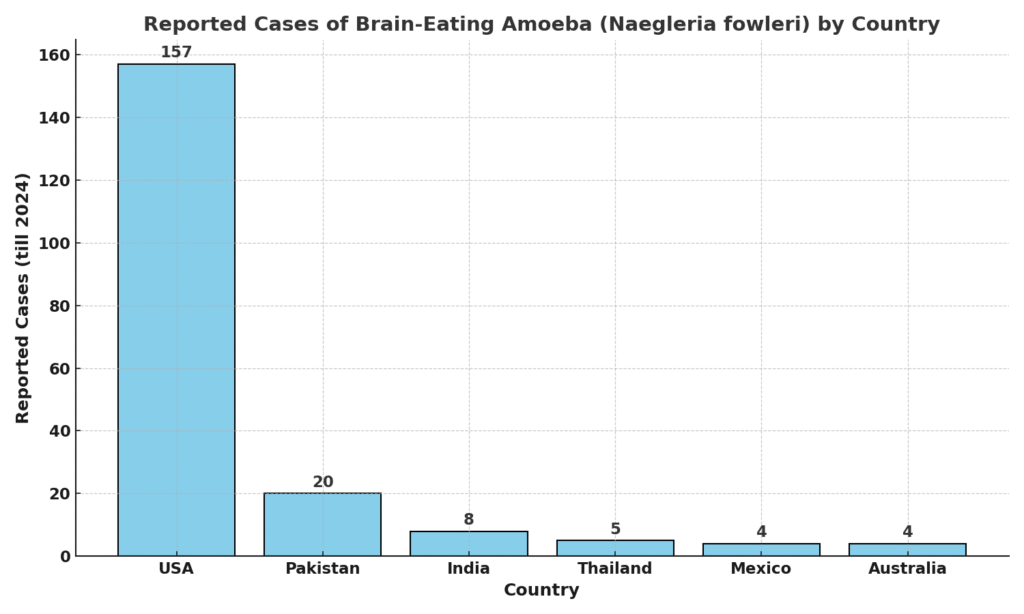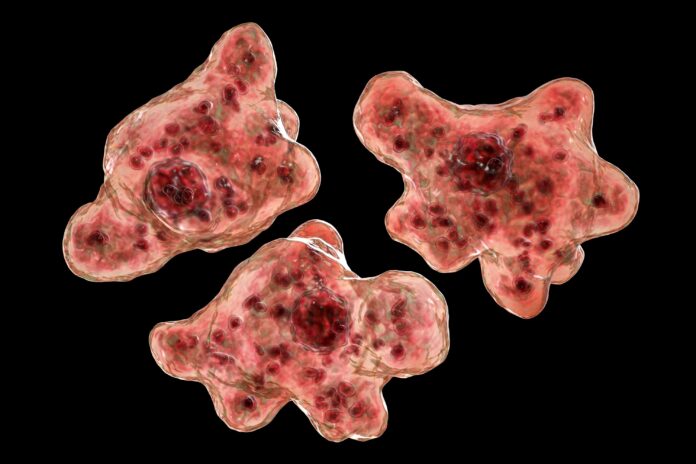Kerala is in the grip of a public health scare after authorities confirmed a surge of infections caused by Naegleria fowleri, commonly known as the brain-eating amoeba. At least 80 cases of Primary Amoebic Meningoencephalitis (PAM) have been reported in the state, with 21 deaths, prompting urgent advisories and public awareness campaigns. Health officials have urged residents to exercise extreme caution in using freshwater sources for swimming, bathing especially the nasal cleansing.
Naegleria fowleri is a microscopic organism that thrives in warm freshwater and can enter the human body through the nose. There is no evidence that it actually nibbles on brain or feeds on brain. But once inside, it travels to the brain, triggers an acute and almost always fatal infection. Symptoms such as fever, severe headache, nausea, vomiting, stiff neck, seizures and loss of balance can appear within days of exposure. The disease progresses rapidly and is often fatal within a week if left untreated.
To tackle the outbreak, Kerala’s Health Department has stepped up surveillance, issued advisories and launched campaigns warning against the use of untreated freshwater. Mahatma Gandhi University in Kottayam has opened a dedicated water-testing facility for amoebic detection, signalling a systematic approach to curb the threat. The state’s efforts include urging the public to avoid unprotected swimming in rivers and ponds and to use safe, treated or boiled water for nasal irrigation and religious practices.

Public health experts note that Kerala’s climatic conditions – prolonged heat, monsoon flooding, and challenges in water management – may be providing the ideal breeding ground for the amoeba. The World Health Organization (WHO) has already flagged the importance of proper chlorination and safe water use, advising communities to avoid using untreated or stagnant water for personal use.
Souding alarm at this new outbreak in India, the Ministry of Health & Family Welfare informed the parliament that the diagnostic testing results for five children with clinical diagnosis of Acute Encephalitis and cerebro spinal fluid (CSF) is showing motile amoeba.
“Out of the five, three cases have microbiological features of Vermamoeba vermiformis and one case has been confirmed as Naegleria fowleri on PCR testing. Based on the media alert generated by Integrated Disease Surveillance Program (IDSP), the Ministry through the Central Surveillance Unit (CSU) of National Centre for Disease Control (NCDC) Branch at Kozhikode along with the State / District health officials conducted a joint assessment of cases,” it said.
“The disease surveillance team of Kerala Govt has been closely monitoring and investigating the cases. As per requirement, central expert team would be assigned for the same. State Government is conducting Information Education and Communication (IEC) campaigns to educate the public regarding amoebic meningoencephalitis, its cause, symptoms, and preventive measures,” it added.
Globally, Naegleria fowleri is rare but feared. The United States has reported more than 150 cases since the 1960s, mostly linked to swimming in warm lakes and rivers. Sporadic incidents have been documented in countries such as Australia, Pakistan and Mexico. India now finds itself on the global map with an unusually high concentration of cases, especially in Kerala. Experts warn that climate change – driving up temperatures in freshwater bodies – along with rapid urbanisation and patchy sanitation systems, are making the world more vulnerable to such infections.
How to Reduce the Risk
- Avoid swimming or diving in warm freshwater bodies, particularly during hot weather
- Use nose clips when swimming in ponds, rivers or lakesEnsure swimming pools are properly chlorinated and maintained
- Do not use untreated tap water for nasal irrigation or religious ablution; only distilled, boiled (and cooled) or filtered water is safe
- While the threat of Naegleria fowleri remains rare, the Kerala outbreak is a reminder that rising temperatures, poor water treatment and lack of awareness can create deadly vulnerabilities
- Public vigilance and strong water safety standards will be the key to preventing further tragedies.



